
*
It can't be easy growing up as the offspring of a Very Famous Person. But when your dad is David Mamet, one of our greatest living playwrights and an Oscar-nominated screenwriter of films like "The Verdict" and "Wag the Dog" and your mother is the actress Lindsay Crouse ("House of Games"), you have enough show business baggage to clog up the security screener at La Guardia.
Zosia Mamet, who has captured hearts as Shoshanna on HBO's cult hit series "Girls," has revealed that awkward moments about her pedigree have already abounded in her nascent career in Hollywood. One older director she met was quick to share how much he hated her father. At another audition, as she stood before a group of male producers and casting agents, one of them remarked that she had her mother's lips. A naturally private person and self-described loner, Mamet thought about changing her last name when she started in the business, but decided to keep it.
Fortunately, the 24-year-old actress is starting to carve out her own singular name and reputation in show business, apart from her celebrated parents. Mamet, whose first name is pronounced ZAH-shah (like Sasha, but with a "z"), first burst onto the scene as Peggy Olson's sardonic lesbian friend Joyce on "Mad Men." A photo editor at Life magazine, cool-girl Joyce pulled Peggy into the bohemian world of 1960s New York and introduced her to current squeeze Abe. Mamet has also played memorable recurring roles on "Parenthood" and "United States of Tara" in the past few years.
But she's made her most indelible mark the nervous, speed-talking, "Sex and the City"-obsessed Shoshanna on "Girls" — a character so sincere and insecure at times it's painful to watch. But as the first season of "Girls" progressed, Shosh has become a fan favorite, despite her palpable insecurity, mile-a-minute speaking voice and odd inflections, her frequent use of "like" and "totes" in conversation, and her obsession with the color pink and other girly affectations. As a New York Times profile of Mamet recently put it, "[Shoshana] is the weirdest one and the most normal one" on the show. The character, a cousin of Jessa's and a virgin up until the end of last season, was originally conceived as only a tangential friend to the three main characters (Hannah, Marnie and Jessa). But creator Lena Dunham (who also plays Hannah) has said that Mamet's eye-opening audition tape shifted her original conception of the role, and before Mamet knew it, the show went from three main girls to four.
The summer after high school, Mamet spent a summer at the training program at the Atlantic Theater Company, which was cofounded by her father. While she has mostly focused on television and film work since first becoming a professional actress at the age of 14, she wants to do more theatre. Now she's getting her chance. This month, Mamet is costarring alongside Matt Lauria ("Friday Night Lights") in the New York premiere of Really Really for MCC Theater, which is now playing at the Lucille Lortel Theatre.
Written by Paul Downs Colaizzo (read the Playbill features about him here) and directed by Obie-winner David Cromer, Really, Really is set on campus at an elite college among a group of undergrads facing the woozy aftermath of a wild campus kegger. As morning-after gossip about a booze-addled hookup between Davis and Leigh starts to turn ugly, what unfolds is contrasting he said/she said accounts of the previous night that threatens to engulf everyone around them. Mamet plays the enigmatic Leigh, who comes from a hardscrabble background. When her wealthy, controlling boyfriend Jimmy (Evan Jonigkeit) finds out about her tryst, a panic-stricken Leigh tells Jimmy she was raped. But a seemingly sensitive Davis (Lauria) can't remember what happened. This twisty, sexually-charged drama offers a scathing critique of what one student in the play has dubbed "Generation Me." The characters, with their caustic wit and profane tongues, are brash, manipulative and forever scheming. As their coolly calculating minds spin into high gear, each character seems increasingly intent on selfish survival at whatever costs, no matter who has to take the fall.
Having garnered critical kudos during its run last year at the Signature Theatre in Washington, DC, Really Really comes to New York riding the wave of a Helen Hayes Award nomination for Outstanding New Play or Musical.
Speaking with Mamet via phone, the actress comes across as reserved and soft-spoken, but also smart and engaging, her words often punctuated with easy laughter.
Really Really centers on a group of "coldly-calculating collegians." Tell me about the central conflict in Really Really. And what's the play really about in your mind?
Zosia Mamet: I think that takes away from the play if I reveal too much about the plot. But I think essentially it's about a very complicated moment in a human's life — this crossroads right before you're shot out into the real world. And, except for my character, the kids in this play are very, very affluent. They've grown up in this very sheltered land, they go to a super-highbrow college, and have never had to step into the real world and the real economy. That's a terrifying moment in a human's life. I think at the core, it's very much about how people react when they feel that their survival is threatened — how they react internally and also to each other. It's about human nature.
| |
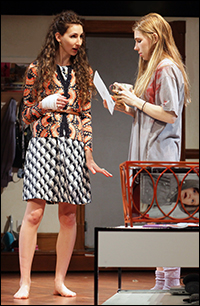 |
|
| Lauren Culpepper as Grace and Zosia Mamet as Leigh in Really Really. | ||
| photo by Janna Giacoppo |
ZM: It's certainly the thing that gets me excited about what I do. That's what real drama is, that's what real life is like. It's not glossy and pretty and perfectly put together. And obviously, to a certain extent, it's a comment on our generation, of course. But at the same time, I think is really transcends [it] as well. I think it's very much about human nature and also about that time in a young person's life that is so very universal. It's inescapable — that moment of feeling so exceptionally lost. … I mean, when you feel your survival is threatened, the first thing on your mind is yourself.
Tell me about your character, Leigh. Who is this girl? And what's going on with her in the play?
ZM: She is the one who is not really part of the group. She's an outsider, she comes from the other side of the tracks, and she sort of fought her way into this land of milk and honey. One of the things I love the most about the play is how ambiguous it is. People will be thinking a lot after they leave this play and maybe not knowing exactly how they feel right away. And I think my character, Leigh is a big catalyst for creating that energy. I mean, all the characters are. And when a character comes across as morally ambiguous, that might alienate some people at first. But I think the interesting thing is: She is perhaps just an extreme version of many of us. Like I think there are many times in life when we think morally ambiguous things and we just don't act upon them. But in this play, many of those things are being acted upon.
| |
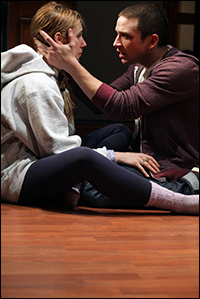 |
|
| Zosia Mamet as Leigh and Evan Jonigkeit as boyfriend Jimmy in Really Really. | ||
| Photo by Janna Giacoppo |
ZM: I think all of the characters in this play are complicated. You know, Paul is a really, really incredible writer, and he's written very clear but very complex and deep characters, which is what human beings are. Especially in that time period, early adulthood…it makes for even more unclear characters. One of the most wonderful parts of this process has been that we've talked a lot, and the conversation has always been open. I think we'll be talking until the night that we open about who these people are and what their souls are and what they care about. And it's constantly changing and morphing. And I think we really wanted to flesh it out as much as possible so that the characters would feel as real as we could make them.
In a Washington Post review of the Signature Theatre production of Really Really last year in DC, Peter Marks wrote that the young people in the play "practice what the playwright sees as the sorry singleminded preoccupation of the age: looking out ruthlessly for Number One." "I'm just doing what I have to do" is a line uttered by more than one character. Granted, it's dangerous to paint an entire generation with such a broad brush stroke, but do you agree with that assessment of your generation? Do you find that to be true personally?
ZM: I think that that's an aspect of the play, but I don't think that it's the whole thing. I mean, I have a little bit of a different experience, because I didn't go to college. I was working during that period when everyone else was in college. I spent a bunch of years hustling my way in the working world. So I didn't really experience that moment in life, those college years between childhood and adulthood, in this exact way. So sometimes it's hard for me to speak to that period in life. But I think there absolutely is an aspect of that [generational critique] that's true. There is, of course, an aspect of selfishness in our generation — and Paul makes sharp points about it. But I also think that there are many other things that he is trying to say with this play. I don't think it's just about that argument.
So do you think it's dangerous to paint an entire generation with a sort of broad brush stroke like that? Plus, to me, it seems that a generation of people is a product of a society — and in this case, with the younger generation today, they're the product of a society in great turmoil.
ZM: Yeah. I mean, there's this great line that the Grace character [played by Lauren Culpepper] has where she says that, "The map of this generation's promise is not one that we were given." I think that's a lot what Paul is commenting on as well. Like, sure, this generation might be selfish, but also we are a product of our upbringing.
How has it been working with director David Cromer on this production?
ZM: He's really wonderful. He's a fascinating human. And he's also one of the best directors I've ever worked with. It's been the most wonderful process. He's so exceptionally collaborative, and it's this mix that you find very rarely in a director. Lena is very much like this as well. They know want they want, and they have an idea of where they want to go. But at the same time, they are so open to anything you have to say or throw out there, which is rare and wonderful when you encounter it.
Turning the tables here, what was it like to be part of the exciting upset for "Girls" at the Golden Globes last month? The show won two Golden Globes, both big upsets, and you were up there on the stage when it won for Best TV Series, Comedy or Musical. (Creator and star Lena Dunham also won for Best Actress in a Comedy Series).
ZM: It was really, really exceptional. None of us really expected that at all, so yeah, it was kind of mind-blowing. It was an absolute fantastic surprise.
| |
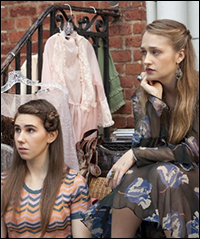 |
|
| Zosia Mamet as Shoshanna and Jemima Kirke as Jessa as on "Girls." | ||
| HBO |
ZM: It's been a whirlwind. None of us expected this show to become what it has. Yeah, it still kind of blows my mind. I sort of forget that people can see the show. We work so hard, and we all love what we do so much, so I think the fact that it has become what it's become in the world, it still has yet to hit us in some ways — or at least me. Because it was never something we thought could happen in our wildest dreams. We just set out to try and make a good television show. So it all still feels very surreal to me.
I've read in a previous interview with you that you never really grew up watching television and that you still don't watch much television now. So what makes "Girls" feel so original and unique among all the many good shows on TV right now?
ZM: With "Girls," it doesn't really feel like I'm doing TV specifically. It just feels like we're making a really long film. That period of life, early adulthood, is really not pretty or cute or great. I think it's very entertaining. But I think it's very gritty and sad; and it can be very dark and scary. And Lena is really showing all of it in a super unapologetic way. So we all strive to keep the show as real as possible while still being entertaining. But I think she's really writing for our generation, from the perspective of our generation, and she doesn't pull any punches. And I think that's why people identify so much with it, because they feel like this is so close to what's happening to them. We don't put on extra makeup in the sex scenes, and we don't make them wear clothes they can't afford. We keep it all very grounded.
You've talked in previous interviews how you're very different from the character of Shoshanna in "Girls." But you always seem to express a real affinity and love for the character. Why do you think you've connected so strongly with Shoshanna? Why is she so close to your heart?
ZM: I mean, I think that she is so different from me. But she's so sincere in her fuck-ups — or just like in her anxiety, in the way that she functions. And I never really played a character like that before. She's very endearing, and I sort of came to love her.
In what ways is Shoshanna so different from you personally?
ZM: She just is! We're two very, very different individuals. I mean, I don't think I even own anything pink. I talk at like a quarter of the speed that she does. [Laughs.] Like the list is endless. She is very specific human.
| |
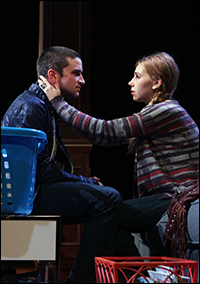 |
|
| Evan Jonigkeit and Zosia Mamet in Really Really. | ||
| Photo by Janna Giacoppo |
ZM: Of course. I mean, it's what you would expect. Some people have certain expectations — unrealistic ones and unfair ones, or preconceived ideas about who you are. And, you know, whenever anybody is trying to make a name for themselves in the world, they want it to be their own name. But it's absolutely a double-edged sword. I love my father dearly, and I'm proud to have come from where I came from.
You say that it's a double-edged sword. So sometimes it can open doors, and other times it just places unrealistic or unfair expectations on you?
ZM: Well, the thing that I love the most about acting is that, like, sure, potentially my name could perk up someone's ears. But at the end of the day, it's on me to deliver the performance. So it's like, if I'm good, I'm good. If I'm not, I'm not. My father's name isn't going to get me a job.
Did your mom or dad give you any particularly helpful or memorable career advice about navigating the shark-infested waters of show business?
ZM: My dad just says, "Know your lines, and always be on time." [Laughs a little.]
Did your parents ever discourage you away from the business? Or did they like that you had an interest in theatre and entertainment?
ZM: Yeah, my father really just wanted me to be happy. I was never discouraged. He knew that I was a goner from Day 1. I never wanted to do anything else
Where do you think that drive or interest to become an actress stemmed from? Knowing what you wanted to do from such an early age.
ZM: I mean, who knows? One could blame it on my upbringing. I was literally born into the theatre. But I don't know. It was just inside me from Day 1.
| |
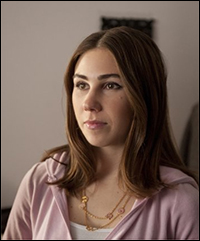 |
|
| Mamet on "Girls." | ||
| photo by Jojo Whilden – © HBO |
ZM: Uhhh, yeah. We're very lucky, we all get along great. When you spend that much time with people, you inevitably get very close.
What's the rest of the season going to look like for Shoshanna? In the last episode that I saw, she and Ray are dating. And they're at a dinner party talking to everyone, and she's telling a story and just suddenly realizes that he's basically moved into her apartment. Can you give us a hint at what's in store for her the rest of the season?
ZM: One of the things that I can say about our second season is that we go harder. I think that's absolutely true. The characters are really starting to question their assumptions. And I think all of the characters are really starting to realize that nobody's going to grow up for them — that they really have to grow up for themselves. And I think Shoshanna really is being forced to confront that fact. She's figuring out how she should deal with things and trying to embrace how she wants to do them.
I know that you've said you're a voracious reader. Do you think you might ever try your hand at playwriting or fiction writing one day?
ZM: I am an avid reader! As for writing, I might — someday. But we'll have to wait and see.









